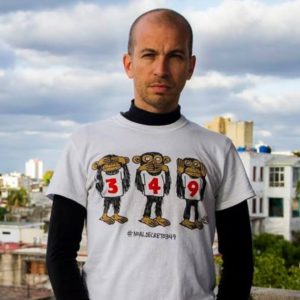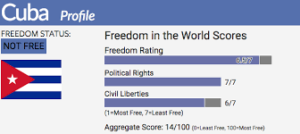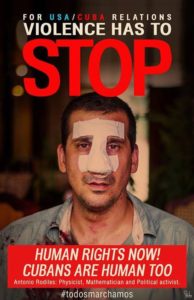
Cuban dissident Michel Matos. Credit: Front Line Defenders
The European Union and Cuba yesterday held their second formal Human Rights Dialogue, under the EU-Cuba Agreement on Political Dialogue and Cooperation. The dialogue is supposed to enhance bilateral engagement in such areas as freedom of expression and access to information, as well as gender equality and the rights of vulnerable groups.
But the dialogue has come under criticism from human rights and democracy advocates for the EU’s anemic response to Cuba’s continued human rights violations.
Cuba is one of several regimes “heading firmly in a more authoritarian direction,” with which the EU has actually deepened cooperation, said analysts Ken Godfrey and Richard Youngs. In a large number of such countries, the EU has either signed or is offering new trade and aid agreements, while dampening any critical edge to its policy—examples include Azerbaijan, Belarus, China, Cuba, Egypt, Kenya, and Vietnam, they contend.
In a few days, the Cuban government will implement significant changes to its political system that, instead of marking the end of its 60-year dictatorship, can serve as a much needed lifeline, notes analyst Daniel I. Pedreira. These changes are the result of the approval of a new Constitution in February of 2019, but they amount to a cosmetic leadership change that offers two likely scenarios, he writes for UPI:
 Scenario 1: Díaz-Canel remains as president (or is replaced by another technocrat), and a member of the Castro dynasty is appointed prime minister. The likeliest Castro to inherit the family’s dynastic control is Alejandro Castro Espín. The only son of Raúl Castro, Castro Espín holds the rank of colonel in Cuba’s Ministry of the Interior, in charge of repression against the island’s opposition….
Scenario 1: Díaz-Canel remains as president (or is replaced by another technocrat), and a member of the Castro dynasty is appointed prime minister. The likeliest Castro to inherit the family’s dynastic control is Alejandro Castro Espín. The only son of Raúl Castro, Castro Espín holds the rank of colonel in Cuba’s Ministry of the Interior, in charge of repression against the island’s opposition….- Scenario 2: The reverse of Scenario 1, this possibility places a Castro (like Castro Espín) as the appointed president, with a technocrat appointed as prime minister. The scenario that will take place depends on which position ultimately holds most of the power. The president is defined as the head of state, but it has not been stipulated if the prime minister will serve as head of government, in which case the latter would hold most of the power. The scenario that will develop also depends on whether the Cuban dictatorship will stick to what it has codified into the Constitution, a feat that has seldom been implemented in its entirety.
 Leadership changes in Cuba will only be superficial and tactical to achieve the dictatorship’s survival, adds Pedreira, an author and researcher at Florida International University. Therefore, whether Cuba has a president, a prime minister or a hybrid regime will only serve to extend its repressive dictatorship.
Leadership changes in Cuba will only be superficial and tactical to achieve the dictatorship’s survival, adds Pedreira, an author and researcher at Florida International University. Therefore, whether Cuba has a president, a prime minister or a hybrid regime will only serve to extend its repressive dictatorship.
A prominent Cuban dissident was one of five activists barred from travelling by their respective governments for a major conference on human rights. More than 120 human rights activists from about 80 countries attended the Dublin Platform for Human Rights Defenders at Risk, organised by Frontline Defenders, The Irish Times reports.
Front Line Defenders executive director Andrew Anderson said that five activists – Khadija Ismayilova from Azerbaijan; Oyub Titiev from Russia; Said Boudour from Algeria; Michel Matos (above) from Cuba; and Marivic Danyan from the Philippines – were prevented from travelling to Dublin.
 “Human rights defenders are guaranteed the right to do their work without harassment or intimidation,” said Mr Anderson. “In these five cases, governments are afraid of the words these human rights defenders will deliver to their peers – that is the message of this cowardly effort to silence them.”
“Human rights defenders are guaranteed the right to do their work without harassment or intimidation,” said Mr Anderson. “In these five cases, governments are afraid of the words these human rights defenders will deliver to their peers – that is the message of this cowardly effort to silence them.”
Russian Prime Minister Dmitry Medvedev hailed his country’s relations with Cuba, saying they have a “brilliant” future as he arrived in Havana for a two-day visit as the island country goes through a new economic crisis while under severe U.S. sanctions, Radio Free Europe / Radio Liberty reports.
Czech Foreign Minister Tomáš Petříček was only 8 years old when the Velvet Revolution of 1989 brought freedom to his country and an end to communist rule {but] he is aware of how his country’s long road to democracy serves as a beacon of hope for others around the world, Amy Ellis writes for FIU:
Petříček spoke at the launch of a new initiative on Cuba at FIU – created through the Václav Havel Program for Human Rights & Diplomacy, a part of the Steven J. Green School of International & Public Affairs….The Initiative for Democratic and Economic Alternatives (IDEAS) for Cuba – a collaboration between FIU, the Inspire America Foundation, the Václav Havel Library in Prague and Columbia University’s Center on Global Economic Governance – will focus on four key areas – diplomacy, economics, law and the historical context of democratic transitions – to explore alternatives for Cuba’s future.
 “This new program will certainly not start from zero,’’ said former dissident Martin Palouš, director of FIU’s Havel program and friend of Václav Havel who served as Czech ambassador to the United States and the United Nations.
“This new program will certainly not start from zero,’’ said former dissident Martin Palouš, director of FIU’s Havel program and friend of Václav Havel who served as Czech ambassador to the United States and the United Nations.
“It will call upon my experiences as a diplomat and a dissident, as well as the experiences of so many others in this room,’’ he said. “We take this program seriously … and I believe it can make a difference.’’







